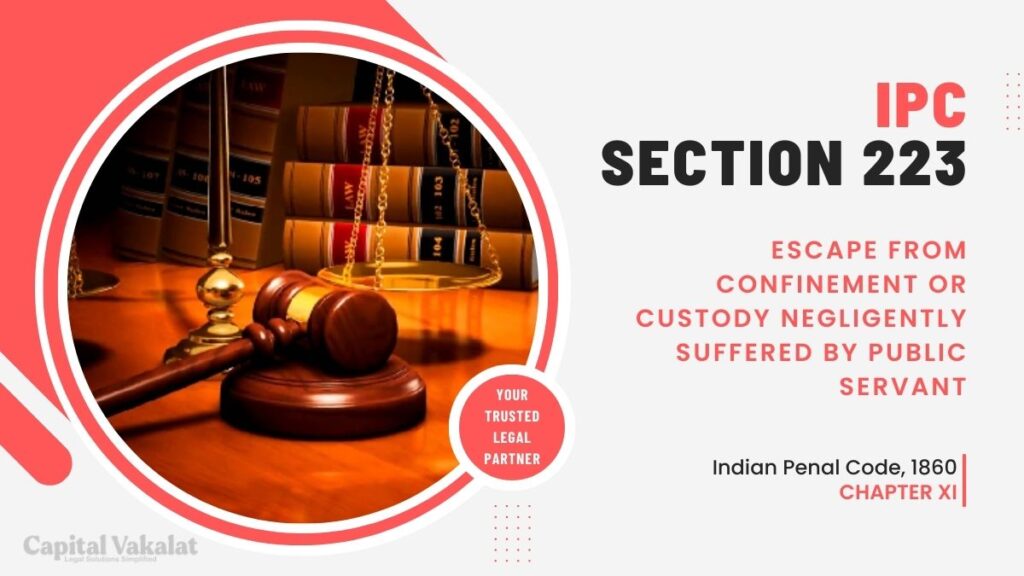In the realm of Indian Penal Code (IPC), there exist numerous sections addressing various aspects of criminal law. One such section, Section 223 IPC, deals with the act of “Escape from Confinement or Custody negligently suffered by a public servant.”

This article delves into the nuances of this section, exploring what it entails, its legal implications, and how it fits into the broader context of criminal law in India.
Understanding Escape from Confinement or Custody
Escape from confinement or custody refers to the act of a person unlawfully freeing themselves from lawful confinement or custody. The crux of this matter lies in the negligence of the public servant responsible for the confinement or custody. Such negligence can have far-reaching consequences in the criminal justice system, as it allows individuals to evade justice.
Negligence of a Public Servant
To understand the essence of Section 223 IPC, we must first comprehend the role and responsibility of a public servant. Public servants, including police officers and correctional facility personnel, have a duty to ensure that individuals under their custody remain confined securely. Negligence in this context implies a failure on the part of the public servant to discharge their duty with the requisite care and diligence.
Legal Consequences of Escape from Confinement
Escape from confinement is a serious offense with significant legal repercussions. When an individual escapes from lawful custody due to the negligence of a public servant, it undermines the integrity of the justice system. As a result, there are provisions in place to address such situations and hold those responsible accountable.
The Elements of Section 223 IPC
Section 223 of the IPC specifies the elements that constitute the offense of escape from confinement or custody negligently suffered by a public servant. To establish a case under this section, the following components must be proven:
- The person was in lawful custody or confinement.
- The custody or confinement was negligently suffered by a public servant.
- The person escaped from such custody or confinement.
Landmark Cases and Precedents
Over the years, several landmark cases have helped shape the interpretation and application of Section 223 IPC. These cases serve as important legal precedents and offer insight into the practical implications of this section. One such case is [Case Name], which highlighted the importance of differentiating between negligence and deliberate intent in escape situations.
Defenses Available in Such Cases
Individuals accused of escape from confinement often have legal defenses at their disposal. These defenses may include arguing that the confinement itself was not lawful or that the negligence of the public servant was not a substantial factor in the escape. Legal professionals play a crucial role in presenting these defenses effectively.
The Role of Legal Professionals
Legal professionals, including defense attorneys and prosecutors, have a significant role to play in cases involving escape from confinement. They must navigate the legal intricacies, gather evidence, and present compelling arguments in court. Their expertise is essential in ensuring a fair trial for all parties involved.
Impact on the Criminal Justice System
The negligence of public servants leading to escapes from confinement has broader implications for the criminal justice system. It erodes public trust and can lead to calls for reform. This section explores how such cases impact the justice system and the measures in place to address these concerns.
Conclusion
In conclusion, Section 223 IPC addresses the escape from confinement or custody negligently suffered by a public servant. It underscores the importance of the responsibility entrusted to public servants in upholding the law and maintaining lawful custody. Negligence in this regard can have far-reaching consequences, affecting not only the individuals involved but also the overall trust in the criminal justice system. Legal professionals, landmark cases, and legal defenses all play pivotal roles in shaping the outcomes of cases falling under this section.
Frequently Asked Questions
What is the punishment for escaping from lawful custody under this section?
The punishment can vary based on the circumstances of the case and is determined by the court.
How can one defend themselves against charges under Section 223 IPC?
Defenses may include arguing that the confinement was not lawful or that negligence was not a significant factor in the escape.
Are there any specific guidelines for public servants to avoid negligence in custody matters?
Public servants are expected to follow established procedures and protocols to prevent escapes, and negligence can result in disciplinary actions.
How does Section 223 IPC impact the public’s perception of the justice system?
Escapes due to public servant negligence can erode public trust in the justice system, leading to calls for reform and improved accountability measures.